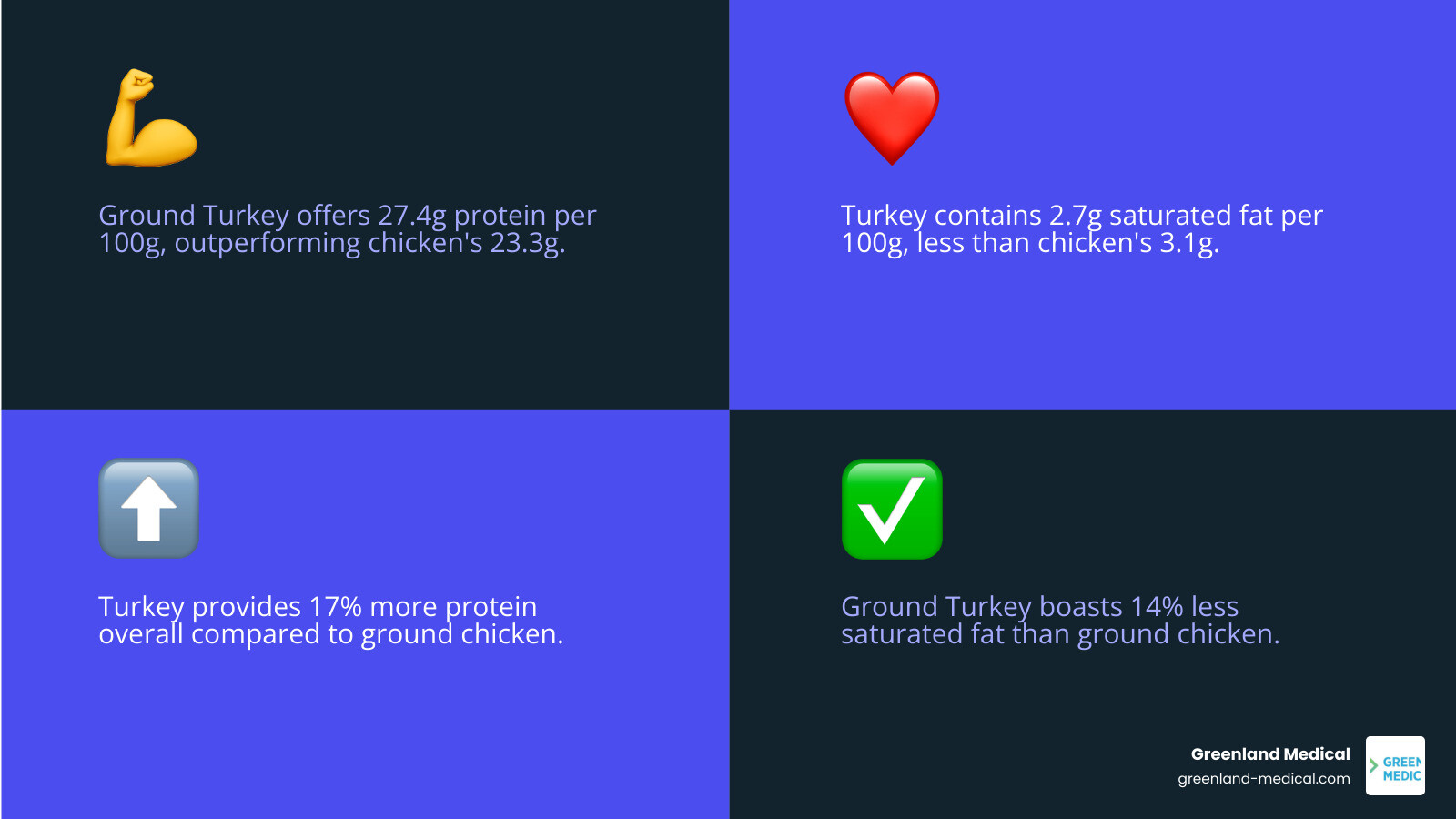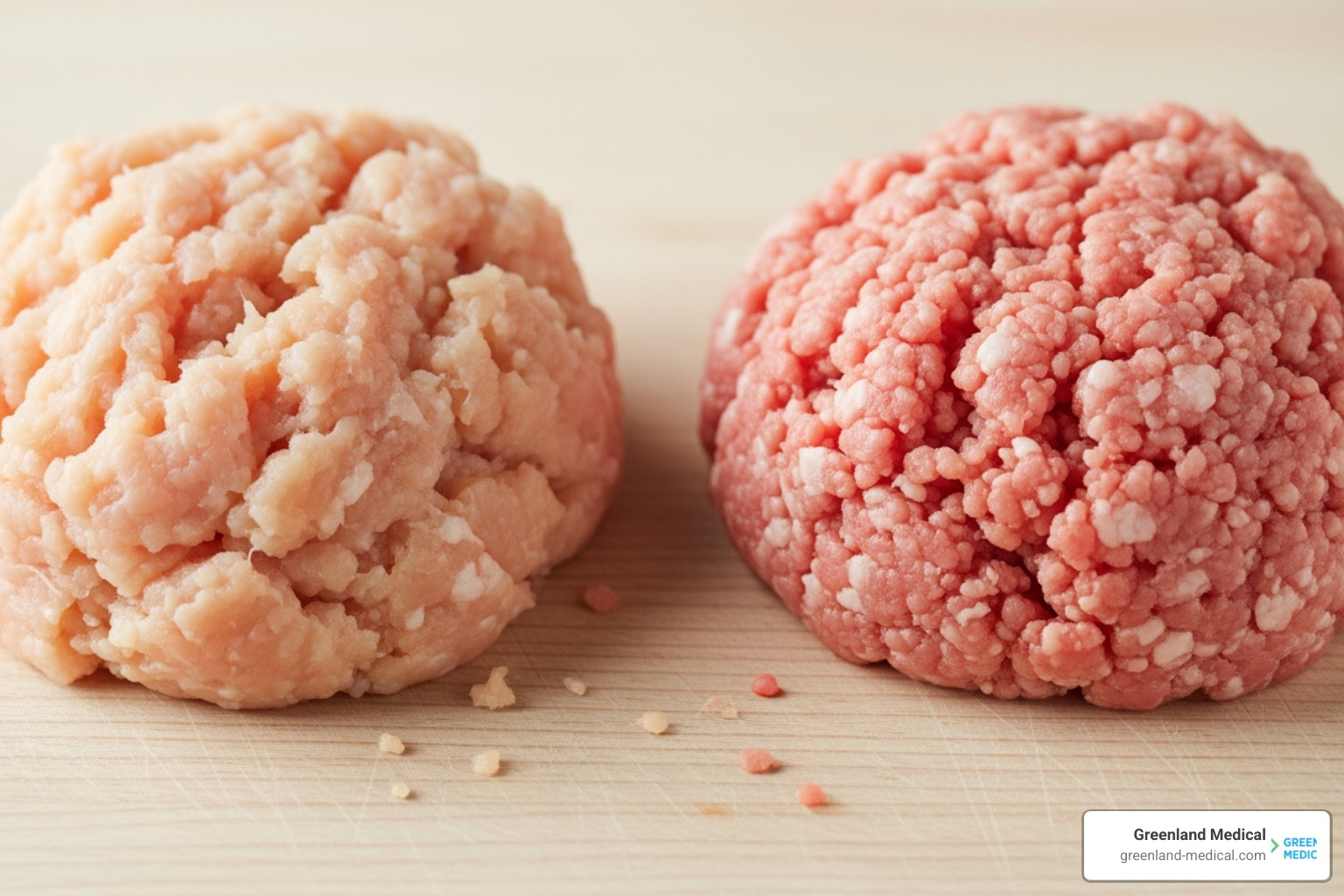
Poultry Power Play: Ground Turkey vs. Ground Chicken Nutrition Facts Revealed
Why Understanding Ground Poultry Nutrition Matters for Your Health
When comparing ground chicken vs ground turkey nutrition, both are excellent lean protein sources. However, turkey often emerges as the nutritional winner with more protein, less saturated fat, and a richer vitamin and mineral profile.
Quick Nutrition Facts (per 100g cooked):
Ground Turkey: 203 calories, 27.4g protein, 10.4g fat, 2.7g saturated fat
Ground Chicken: 189 calories, 23.3g protein, 10.9g fat, 3.1g saturated fat
Key Advantage: Turkey provides 17% more protein and 14% less saturated fat than chicken
For those managing chronic conditions or seeking optimal nutrition, these differences are crucial. Ground turkey has a more favorable fat composition, with higher polyunsaturated fats and lower cholesterol (93mg vs 107mg per 100g). It's also richer in key nutrients like folate, vitamin B12, calcium, zinc, and iron.
Both options significantly outperform red meat for cardiovascular health, as choosing poultry over red meat can decrease cardiovascular risk due to lower saturated fat.
As Dr Andrew Greenland, a Certified Functional Medicine Practitioner, I help patients optimize their nutrition as part of a comprehensive wellness strategy. Understanding the nuances of ground chicken vs ground turkey nutrition allows for precise dietary planning that supports individual health goals.

At a Glance: A Quick Comparison
When it comes to ground chicken vs ground turkey nutrition, the data reveals key differences that can influence your grocery choices. The following values are for 100 grams of cooked, pan-browned meat, but can vary based on the lean-to-fat ratio and whether dark meat is included.
Nutrient (per 100g cooked) Ground Chicken Ground Turkey Calories 189 kcal 203 kcal Protein 23.3 g 27.4 g Total Fat 10.9 g 10.4 g Saturated Fat 3.1 g 2.7 g Cholesterol 107 mg 93 mg Sodium 75 mg 78 mg Iron 0.93 mg 2.27 mg Potassium 677 mg 294 mg
Ground turkey takes the protein crown with nearly 4 extra grams per serving (17% more), and also has lower saturated fat and cholesterol levels, making it ideal for heart health.
However, ground chicken boasts significantly higher potassium content—more than double that of turkey—which is excellent for blood pressure and muscle function.
The iron difference is also striking. Turkey provides more than twice the iron of chicken, a crucial factor for energy levels and addressing iron deficiency. At Greenland Medical, we often see fatigue improve when patients optimize iron intake through such strategic food choices.
These nuances add up, helping you make choices that support your individual health goals.
The Ultimate Ground Chicken vs. Ground Turkey Nutrition Breakdown
Diving into ground chicken vs ground turkey nutrition reveals how these proteins can fuel our bodies. Both are excellent choices I recommend at Greenland Medical, but their unique profiles help tailor dietary plans to individual needs. Understanding their full nutritional value—beyond just calories and protein—is key for addressing chronic health concerns and optimizing wellness. As research confirms, poultry is a cornerstone of a balanced diet, providing high-quality protein and essential nutrients. A study on poultry's role in a balanced diet highlights this importance.
Macronutrient Matchup: A Look at Ground Chicken vs Ground Turkey Nutrition
Let's start with the macronutrients that fuel our bodies.
Protein is where ground turkey really shines. With 27.4g of protein per 100g cooked, it surpasses ground chicken's 23.3g—a 17% advantage. Both provide complete proteins with all essential amino acids for muscle repair. For patients building muscle or recovering from illness, this difference is significant.
The calorie story is interesting. Despite having more protein, ground turkey is slightly higher in calories (203 vs 189 per 100g cooked).
Fat content is similar overall (10.4g for turkey vs 10.9g for chicken), but the lean-to-fat ratio on the package (e.g., 93/7 or 85/15) is more impactful than the type of bird. Extra-lean versions, like 99% lean ground turkey breast, can have as little as 1.5g of fat.
White meat versus dark meat also matters. Ground poultry often includes fattier dark meat (thighs) and skin. For the leanest choice, look for packages labeled as ground breast meat.
Micronutrient Deep Dive: Vitamins and Minerals in Ground Chicken vs Ground Turkey Nutrition
Both ground chicken and turkey are rich in micronutrients, but they excel in different areas.
Ground turkey is a B-vitamin and mineral champion. It has about four times more folate and three times more vitamin B12 than ground chicken—nutrients crucial for nervous system health, red blood cell formation, and DNA repair. For patients with fatigue or cognitive issues, optimizing B-vitamins can improve energy.
Turkey also leads in minerals, providing significantly more iron (2.27mg vs 0.93mg) for oxygen transport, plus more zinc, selenium, and calcium.
However, ground chicken has its own strengths. It's higher in niacin (another B vitamin) and contains about twice the potassium, which supports heart health and blood pressure. Chicken also provides four times more vitamin E, a key antioxidant, while turkey contains vitamin A, which chicken lacks.
The takeaway: Choose turkey to boost iron, zinc, B12, or folate. Opt for chicken for more potassium or vitamin E. Both provide these nutrients in highly absorbable forms.
Understanding the Fat Profile
The type of fat matters as much as the amount for long-term health.
Ground turkey generally has a more heart-friendly fat profile, with less saturated fat (2.7g vs 3.1g per 100g cooked) and less cholesterol (93mg vs 107mg). This gives turkey an edge for cardiovascular health, as confirmed by research on dietary fats and cardiovascular disease.
Ground chicken offers more monounsaturated fats (4.9g vs 3.5g), the healthy fats that help lower bad cholesterol.
Ground turkey wins on polyunsaturated fats (2.9g vs 2.1g), providing more essential omega-3 and omega-6 fatty acids crucial for brain function.
For patients at Greenland Medical with cardiovascular or inflammatory concerns, these differences are important. Turkey's fat profile often makes it the preferred choice, but both fit into a healthy diet.
Beyond the Label: Taste, Texture, and Culinary Uses
Beyond the nutrition label, taste and texture determine how you'll use these proteins in your kitchen. The healthiest meal is one you enjoy eating. Both ground chicken and turkey are versatile, but their unique characteristics make them better suited for different dishes.

Flavor and Texture Profiles
Ground chicken has a mild, neutral flavor and a finer, softer texture. It's a blank canvas that absorbs seasonings well, making it ideal for lighter dishes.
Ground turkey offers a richer, more robust flavor and a coarser, firmer texture. This provides a satisfying "meaty" bite that stands up in heartier recipes. Both can become dry if overcooked, especially leaner varieties.
Best Cooking Applications
Ground chicken's gentle nature is perfect for stir-fries, delicate meatballs, and tacos where seasonings are the star. It also works well in stuffed peppers and dumplings.
Ground turkey's firmer texture makes it the champion for burgers, hearty chili, and meatloaf that need to hold their shape. It's also excellent in robust pasta sauces like Bolognese.
The key to success is moisture management. Handle ground chicken gently to prevent a mushy texture. For lean ground turkey, add moisture with finely chopped vegetables, broth, or olive oil to prevent it from drying out.
At Greenland Medical, we encourage patients to experiment with both. Variety keeps meals interesting and ensures a broad spectrum of nutrients, which is crucial for maintaining healthy eating habits!
Health Implications: Making the Right Choice for Your Wellness Goals
When we consider ground chicken vs ground turkey nutrition, we're thinking about long-term health and disease prevention. Our approach at Greenland Medical focuses on finding and fixing the root causes of chronic illness, and diet plays a foundational role. Making informed choices about protein sources is a significant step towards optimal health. For more detailed insights into our comprehensive strategies, explore more info about integrative medicine services.
Food Safety: Minimizing Health Risks
Food safety is paramount when handling ground poultry to avoid foodborne illness.
Common Pathogens: Bacteria like Salmonella, Campylobacter, and Clostridium perfringens are primary concerns, causing symptoms from nausea to severe complications.
Why Ground Meat is Riskier: The grinding process can mix surface bacteria throughout the meat, increasing the risk compared to whole cuts.
Safe Handling Practices: Wash hands thoroughly before and after handling raw poultry. Use separate cutting boards and utensils to prevent cross-contamination.
Proper Cooking Temperature: Cook ground poultry to an internal temperature of 165°F (74°C), verified with a meat thermometer. Color is not a reliable indicator of doneness.
For more details, see the CDC guidelines on poultry safety. Following these steps minimizes health risks.
How Poultry Compares to Red Meat
Many people choose poultry as a healthier alternative to red meat like ground beef.

White Meat vs. Red Meat: Chicken and turkey (white meat) are generally leaner and have less saturated fat and cholesterol than beef (red meat).
Ground Beef Comparison: Poultry is typically lower in calories and fat. For example, 80/20 ground beef has about 272 kcal and 17.4g of fat per 100g, while ground turkey has 203 kcal and 10.4g of fat. Poultry also has significantly less saturated fat (2.7-3.1g vs. over 6g in beef), which is crucial for cardiovascular health. While beef is higher in iron and B12, poultry offers other benefits like higher potassium (chicken) and a better overall fat profile.
Environmental Footprint: Poultry farming generally has a lower carbon footprint than beef production, making it a more eco-conscious choice. Choosing organic or free-range options further supports sustainability.
Aligning Your Choice with Dietary Needs
The best protein choice aligns with your individual health goals—the cornerstone of personalized functional medicine.
Weight Management: Both are excellent protein sources that promote satiety. Leaner options (like ground breast meat) offer more protein per calorie.
Muscle Building: Both provide the essential amino acids needed for muscle repair and growth, making them ideal for athletes.
Heart-Healthy Diets: Ground turkey's lower saturated fat and cholesterol make it slightly preferable for cardiovascular health, though both are far better than fatty red meats.
Low-Fat Diets: For minimal fat intake, choose the leanest versions available, such as 99% lean ground breast meat.
Bredesen Protocol: At Greenland Medical, we use protocols like the Bredesen Protocol for cognitive decline, which emphasizes lean proteins. Both ground chicken and turkey fit perfectly, providing high-quality protein without excess saturated fat. Our goal is to fix the root cause through precise nutritional choices.
For those with specific sensitivities, understanding your unique physiology is key. We offer information on food sensitivity testing to help.
Frequently Asked Questions about Ground Poultry
At Greenland Medical, our patients in Richmond, Twickenham, and beyond often have questions about incorporating ground poultry into their diets. Here are the most common ones we hear about ground chicken vs ground turkey nutrition.
Which is generally leaner, ground chicken or ground turkey?
The answer depends on the cut of meat used. Standard ground turkey is typically slightly leaner than standard ground chicken (10.4g of fat vs. 10.9g per 100g). However, the leanest options for both are made from ground breast meat. A 99% lean ground turkey breast can have as little as 1.5g of fat per serving. Standard ground poultry often includes fattier dark meat (thighs and legs) and skin.
My advice? Always check the lean-to-fat ratio on the label (e.g., 93/7 or 85/15). For patients on specific health protocols, choosing the highest lean percentage is crucial.
Can I substitute ground chicken for ground turkey in recipes?
Yes, ground chicken and turkey are interchangeable in most recipes. We encourage patients to use both for variety. The flavor and texture differences are subtle. Chicken is milder and softer, while turkey is richer and firmer. In seasoned dishes like tacos, chili, or pasta sauces, the difference is often unnoticeable.
Turkey's firm texture is great for burgers and meatloaf, while chicken's softer texture suits delicate meatballs or lettuce wraps. The main consideration is moisture management. When substituting a leaner poultry, you may need to add moisture (broth, olive oil, chopped vegetables) to prevent dryness.
Is organic or free-range poultry a healthier choice?
At Greenland Medical, we emphasize food quality. While nutritional differences can be small, there are compelling reasons to choose organic or free-range poultry.
Antibiotic use is a key factor. Organic standards restrict antibiotic use, which helps combat antibiotic resistance and aligns with our functional medicine approach.
From a nutritional standpoint, while macronutrients are similar, some research suggests free-range poultry may have a better fat profile, with more beneficial omega-3s due to a more natural diet and activity.
Farming practices are also important. Organic and free-range standards typically mean more humane treatment, better sustainability, and avoidance of GMOs and synthetic pesticides. This helps patients reduce their toxic load. Choosing these options aligns with a holistic health approach where what's good for the planet is also good for us.
Conclusion: The Final Verdict in the Poultry Power Play

In the ground chicken vs ground turkey nutrition debate, there's no single winner. Both are excellent lean proteins that can significantly benefit your health.
Ground turkey edges ahead for maximizing protein and minimizing saturated fat. With more protein, iron, zinc, and B vitamins, it's a strong choice for muscle building and heart health.
Ground chicken shines with its high potassium content for blood pressure support and its versatile, mild flavor perfect for a wide range of dishes.
The best choice depends on your unique needs. Managing heart health? Turkey's lower cholesterol helps. Building muscle? Turkey's higher protein is an advantage.
At Greenland Medical, we help patients in Richmond, Twickenham, and London understand their individual biology. This personalized approach is crucial for addressing chronic illness or optimizing cognitive function.
The healthiest protein is one you enjoy and eat consistently. Making informed choices that align with your body's needs is the key to long-term wellness. Your journey is about consistent, smart decisions. Explore our functional medicine services to create a personalized nutrition plan that addresses your specific health goals.
